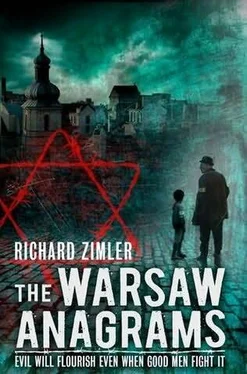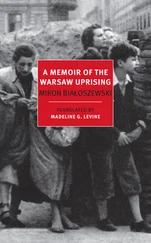Leaning back against the wall for support, I told myself I had saved her from wasting her time on me, but in truth I’d wanted to slice one more wound into the only enemy I could reach.
Izzy came over again late that afternoon. I was sitting in bed with my dream diary, scribbling a list of all the cities I would have wanted to visit if I weren’t where I was.
‘You’re up!’ he exclaimed, astonished. ‘What are you writing?’
‘I’m deciding where I’ll go when I get out of here.’
Only after that reply popped out of my mouth did I realize it was true. I went over what I’d written. Genoa seemed my best option – a former colleague of mine from Vienna was living there, and I could probably catch a steamer to Izmir. Or England. Hannah and I had spent our honeymoon in London – and two other vacations there – and we’d always loved it.
‘A man from the Jewish Council came over last night,’ Izzy told me, sitting down at the foot of my bed. ‘He said his name was Benjamin Schrei.’
The mattress sagged towards Izzy. I felt I was made of broken and rusted metal, and all those useless pieces inside me were sliding in his direction.
‘I told him you were sleeping, but he wants to talk to you,’ Izzy continued, and then he poked around his mouth with his tongue and spat something into his hand.
‘What’s that?’ I asked.
‘A tooth,’ he replied. ‘They’ve been falling out.’
‘Open your mouth,’ I told him.
I looked in. His gums were bleeding and his breath was putrid, like mouldy bread.
‘What the hell is happening in there?’ I asked.
‘Scurvy,’ he replied. ‘I managed to buy some oranges, but they haven’t helped yet.’
‘Lemons would be better,’ I observed.
‘So find me a lemon.’
‘Does it hurt?’
‘Only when I eat or talk,’ he replied dryly. ‘So what do you think Schrei wants?’
‘Who gives a damn!’ I replied, and I realized that that was what Stefa would have said. Was that how I would go on – by imitating the sound of her voice in my head? After I’d drawn one tight circle around Genoa, and another around London, I added gruffly, ‘You shouldn’t have told Bina she could help me.’
‘Why not?’
‘Because she can’t!’ I declared.
‘You know, a little solidarity right now might help,’ he advised me, examining his tooth keenly, as if it were a precious artefact from the Dead Sea.
‘But what could Bina possibly do for me? I don’t want anything to eat, and she doesn’t know who murdered Adam or Anna, and…’
He threw the tooth and hit me on the side of my head. ‘I meant you could show a little solidarity towards her , you nincompoop! The girl is starving to death under that big coat of hers.’
Izzy made turnip soup while I worked on my list of escape routes. A half-hour later, while we were slurping away, I jotted down the names of the places I’d go if I could live out my fantasies of reaching a tropical paradise – Bangkok, Rangoon, Mandalay…
I wanted to wake up to warmth every day, and green, luxuriant life creeping through every crack in the sidewalk, overgrowing rooftops, walls and barricades. I wanted to eat red and yellow handfuls of tropical fruit for breakfast and spit the seeds into the moist soil of my garden, and watch them sprout, and go swimming in an ocean where fern-tailed seahorses and puckered moonfish peeked out at me from their hiding places in coral thickets. I wanted to wake up to the finch-like cries of boys and girls playing naked on the beach. I wanted to be where no one had ever heard German.
I couldn’t know when I was fifteen or even fifty what would break my heart, could I? I ask that because it often now seems as if I’d always known that Hannah, Adam and Stefa would die before me.
Imagine black dye running off into every memory. Nothing survives that isn’t grey.
Rowy, Mikael, Ziv, the Tarnowskis and other friends came by to check on me over those first days following Stefa’s death, but I remember very little of what they said. The only conversation I remember clearly was Rowy telling me he’d obtained funding to buy new musical scores, as well as cheap fiddles, recorders and other instruments; he’d decided to organize a youth orchestra.
The Adam who resided inside me now made me listen to his plans clearly.
With his eyes focused on a brighter future, Rowy also told me that Ziv had generously volunteered to help him search for talented street performers throughout the ghetto on his day off.
Curiously, Ewa and Helena never visited me.
I tossed words back and forth with all my guests, but most of the time I was thinking of how I’d have preferred to be alone. And how I wished I’d taken Stefa and Adam to be photographed. So many lost opportunities rattled in my head after my niece’s miracle, but I didn’t want to ever free myself from them.
Do I need to tell you why, Heniek? Maybe it’s not a bad thing to risk being too clear on occasion: they were proof of all my niece had meant to me.
Sunday was the funeral. I refused to go. I smoked my pipe and watched the rain pelting my window.
Izzy came over afterwards. He collapsed on my bed, face down, the crook of his arm over his eyes. He was sopping wet. He smelled like mud.
I dropped down next to him and held his shoulder. ‘I’ve decided to help Bina,’ I told him; I wanted to please him.
But he wouldn’t look at me.
I took off his shoes and socks, dried his face and arms, and got him under the covers.
While he slept, I retrieved my dream diary, turned to my list of the dead and added Stefa’s name, shivering with relief. I’d almost forgotten to do that. It scared me how we could forget our most important duties.
That night, I woke with a start and lit my carbide lamp, unsure now whether I’d really added her name. Staring at Stefa Liska , I wondered about the power of our names to alter our destiny, until the letters lifted off the paper. Soon, all the names of the dead – my dead – were floating in the pearly blue light, like butterflies kept aloft by a wind made of my own thoughts. The effect was pretty, but I knew it was only an optical trick; and yet the longer I kept my eyes on them, the more Stefa’s and Adam’s names seemed wrong – misspelled or mistakenly given to them. So I started rearranging their sequence of letters, which was when it occurred to me that this must have been why I’d made the list in the first place: to find the new names we ought to have given ourselves to protect us from the Germans and all the evils they’d brought with them.
I spent most of the next five days in bed. I slept in and out of twisted half-dreams, and their incompleteness gave me the troubling impression that Adam had wanted to tell me more about his thoughts and feelings – things only I would have understood.
I told all my visitors I felt abandoned and fragile, which had the advantage of being both true and what they wanted to hear, since it gave them the chance to offer me sympathetic looks and words of comfort. They also wanted to be reassured that I’d never give up so that they could believe in the quiet heroism of men and women – and more particularly, of the Jews.
I don’t mean to sound cynical about my friends; they were caring people, and they were under no obligation to give up their hopes for a happy ending.
To myself, however, I made the promise that I’d take Stefa’s way out after finding Adam’s killer.
That week, couriers delivered three letters smuggled in from the Other Side – from Christian friends to whom Stefa had written about Adam’s murder. Among them was one from Jaśmin, my former patient. At the end of her long and moving letter, she told me she was talking about the wretchedness of the ghetto to whoever would listen – even foreign journalists – and that I mustn’t give up hope of getting out.
Читать дальше












